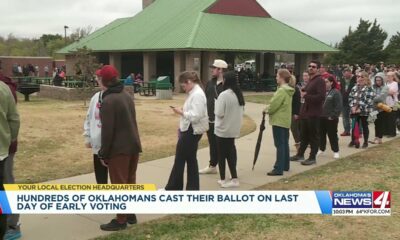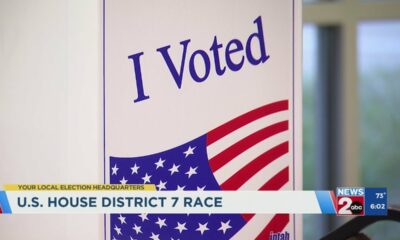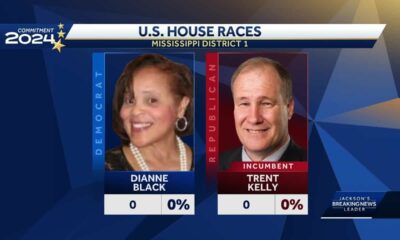Mississippi News
Legislature could address felony voting ban for first time since 2008

Legislature could try to address felony voting ban for first time since 2008
The state House of Representatives overwhelmingly passed legislation in 2008 to restore voting rights to all Mississippians convicted of felonies, except for those convicted of murder or rape.
The 2008 legislation later died in the Senate, where Phil Bryant presided as lieutenant governor. Current House Speaker Philip Gunn, then a sophomore legislator from Clinton, was among the few House members to vote against the 2008 bill.
Since 2008 there has not been any serious efforts by legislators to move Mississippi more toward the nation’s mainstream, where in more than 40 states voting rights for those convicted of felonies are restored automatically at some point after their sentence is completed.
In the upcoming 2022 session, House Judiciary B Chairman Nick Bain, a Republican from Corinth, has vowed to try to make the process of restoring voting rights for Mississippians with felony convictions “more consistent and fairer.”
What that effort looks like remains to be seen. Bain has stressed that at this point he is not trying to completely scrap Mississippi’s archaic felony voting ban.
The surest way to make whatever changes Bain decides to try to make would be to amend the 1890 Constitution to revise the language that disenfranchises people convicted of certain felonies.
“Obviously we can try to amend the Constitution, but that is a high burden,” said Bain, who held a legislative hearing in October on the issue.
Changes to the state Constitution require approval by two-thirds of the members of each chamber of the Legislature and voter approval.
The current language in the Constitution says to restore voting rights, approval is needed from two-thirds of the elected membership of both chambers of the Legislature. Voting rights also have been restored through gubernatorial pardons and by judicial expungements, though the process is burdensome and not allowed for all convicted of felonies.
The Legislature normally approves individual bills to restore voting rights one person at a time. Normally less than five people have their rights restored each year. In the 2021 session, the rights of just two people were restored.
But there seemed to be a consensus at Bain’s October hearing that rights could be restored to large swaths of people in one piece of legislation instead of restoring rights one person and one bill at a time.
Some said they believe the Legislature has the constitutional authority to restore rights to just those already convicted.
But Paloma Wu, a deputy director with the Mississippi Center for Justice, said she believes the Constitution is not clear on the issue and said legislators could restore voting rights for people convicted in the future and allow the courts to interpret the issue should a lawsuit be filed challenging the law.
Most all agreed, though, that to restore the rights to a large group of people would take two-thirds approval from members of both chambers just as it does to restore rights to an individual convicted of a felony. That process could prove difficult in a Legislature where in recent years, many members of the Republican majority have been reluctant to restore voting rights.
In a perfect world, Bain has said he believes it should be another entity, such as the judiciary, and not the Legislature that restores voting rights. It is not clear whether giving that authority to the courts could be done without a constitutional amendment.
There is no public polling on whether voters would support removing the lifetime ban on voting if the Legislature offered such a proposal to the electorate. In Florida, voters overwhelmingly approved an initiative removing the ban.
One of the problems with the current process in Mississippi, Bain has said, is that a person faces a lifetime ban on voting for a felony bad check writing conviction, for instance, but could vote while in prison if convicted of child pornography or of being a major drug dealer.
The current system of disenfranchisement for those convicted of certain felonies has its roots in the state’s Jim Crow-era.
In the 1890s, the Mississippi Supreme Court wrote the disfranchisement of people of specific felonies was placed in the Constitution “to obstruct the exercise of the franchise by the negro race” by targeting “the offenses to which its weaker members were prone.” The crimes selected by lawmakers to go into the Constitution were thought by the white political leaders as more likely to be committed by African Americans.
That provision is currently being challenged on constitutional grounds in the federal courts with two cases pending before the 5th Circuit U.S. Court of Appeals. Attorneys have argued that the provision’s intent is the same as the poll tax, the literacy test and other Jim Crow-era provisions that sought to prevent African Americans from voting.
Another sure way to change the state’s felony suffrage ban is for the courts to strike it down.
This article first appeared on Mississippi Today and is republished here under a Creative Commons license.
Mississippi News
Events happening this weekend in Mississippi: April 18-20

SUMMARY: This weekend (April 18-20), Mississippi offers a variety of events for all ages. In Jackson, enjoy Food Truck Friday, a jazz concert, free outdoor movie screenings, and multiple exhibitions including “Of Salt and Spirit” and “Hurricane Katrina: Mississippi Remembers.” For family fun, there’s an Easter Egg Hunt at the Ag Museum and “Bunnies & Butterflies” at MCM. Natchez features the Spring Pilgrimage, Lafayette’s 200th anniversary celebration, and a farmers market. In the Pine Belt, highlights include Live at Five, a Spring Candle-Making Workshop, and Easter events at the Hattiesburg Zoo. Don’t miss the Bluff City Block Party and more!
The post Events happening this weekend in Mississippi: April 18-20 appeared first on www.wjtv.com
Mississippi News
Events happening this weekend in Mississippi: April 11-13

SUMMARY: This weekend in Mississippi (April 11-13), enjoy a variety of events across the state. Highlights include the Eudora Welty Birthday Bash in Jackson, Trivia Night at the Mississippi Museum of Natural Science, and Boots & Bling Fundraiser in Natchez. For family fun, check out the Bunny Bonanza in Jackson or the Easter Egg Hunt in Clinton. The Natchez Concours d’Elegance Car Show and Stranger Than Fiction Film Festival offer cultural experiences, while the 12th Annual Dragon Boat Regatta in Ridgeland and the Hub City Classic Car Show in Hattiesburg provide exciting activities for all ages.
The post Events happening this weekend in Mississippi: April 11-13 appeared first on www.wjtv.com
Mississippi News
Ole Miss women get pair of double-doubles and roll to 83-65 March Madness win over Ball State

SUMMARY: Mississippi coach Yolett McPhee-McCuin found solace in returning to a different arena in Waco, Texas, following a disappointing previous tournament experience. The No. 5 seed Ole Miss Rebels redeemed themselves with an 83-65 victory over 12th-seeded Ball State in the NCAA Tournament’s first round. Starr Jacobs led the Rebels with 18 points and 11 rebounds, while Kennedy Todd-Williams and Madison Scott each scored 15 points. Ole Miss dominated rebounding, leading 52-32, and will face fourth-seeded Baylor next. Coach McPhee-McCuin noted the team’s evolution since their last visit and the significance of playing in Texas, where Jacobs feels at home.
The post Ole Miss women get pair of double-doubles and roll to 83-65 March Madness win over Ball State appeared first on www.wjtv.com
-

 Mississippi Today6 days ago
Mississippi Today6 days agoOn this day in 1873, La. courthouse scene of racial carnage
-

 Mississippi Today6 days ago
Mississippi Today6 days agoLawmakers used to fail passing a budget over policy disagreement. This year, they failed over childish bickering.
-

 Local News7 days ago
Local News7 days agoAG Fitch and Children’s Advocacy Centers of Mississippi Announce Statewide Protocol for Child Abuse Response
-

 Local News6 days ago
Local News6 days agoSouthern Miss Professor Inducted into U.S. Hydrographer Hall of Fame
-

 News from the South - Alabama News Feed4 days ago
News from the South - Alabama News Feed4 days agoFoley man wins Race to the Finish as Kyle Larson gets first win of 2025 Xfinity Series at Bristol
-

 News from the South - North Carolina News Feed7 days ago
News from the South - North Carolina News Feed7 days agoHelene: Renewed focus on health of North Carolina streams | North Carolina
-

 News from the South - Alabama News Feed5 days ago
News from the South - Alabama News Feed5 days agoFederal appeals court upholds ruling against Alabama panhandling laws
-

 Our Mississippi Home7 days ago
Our Mississippi Home7 days agoFood Chain Drama | Our Mississippi Home




















































